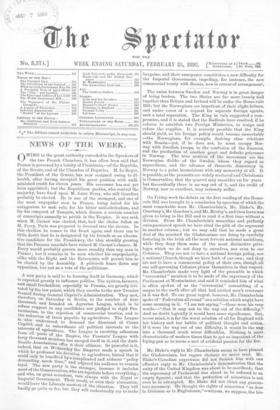On Friday week the debate on the first reading of
the Home. rule Bill was brought to a conclusion by speeches of which the most remarkable were Mr. Chamberlain's, Mr. Blake's, Mr. Courtney's, Mr. Goschen's, and Mr. Morley's, and then leave was given to bring in the Bill and to read it a first time without a division. From Mr. Chamberlain's masculine and perfectly unimpassioned speech we have cited the pith of the argument in another column ; but we may add that he made a great deal of the mischief the Glad stonians are doing by carefully fostering in the Irish all the most fervent national ambitions, while they deny them some of the most distinctive privi- leges which we do not deny to ourselves, nor even to our Colonies. They are not to have a national foreign policy, nor a national Church, though we have both of our own; and they are not to have a commercial policy of their own, though all our self-governing Colonies please themselves in that respect. Mr. Chamberlain made very light of the preamble in which "reverential" mention is to be made of the supremacy of the Parliament at Westminster, and said it reminded him of what is often spoken of as the "reverential" committing of a corpse to the earth after all that had excited men's reverence in it was fled. To our great regret, however, Mr. Chamberlain spoke of "Federation all round" as a solution which might have some meaning in it. "I am not saying,"—these were his very words,—" that it may not be the way out of the difficulty." And no doubt logically it would have some significance. But, to our mind, it is far the worst solution of all for England with her history and her habits of political thought and action. If it were the way out of one difficulty, it would be the way into a thousand much worse difficulties. Nothing is more characteristic of modern times than to get so impatient of the frying-pan as to nurse a sort of artificial passion for the fire.


































